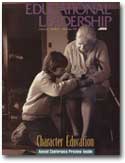A song from a Broadway show a few decades ago asked, “What's the matter with kids today? Why can't they be like we were, perfect in every way?” It was a playful satire on the tendency of adults of every generation to worry about the behavior of youth.
But it's not nostalgia or crankiness that provokes our concern these days; it's a frightening increase in violent behavior and a seeming lack of basic human values among some young people. Teachers contend with shocking levels of aggression and profanity. Police are witness to weekend parties where teenagers get drunk and use drugs. And every major city now has drive-by shootings and gun battles on school playgrounds.
I don't mean to condemn an entire generation; lots of young people lead productive, healthy lives. But many are not “like we were,” and for good reason; the factors that shape their lives are very different. Because of social and economic changes, family patterns and work arrangements have irrevocably altered. Consequently, many children receive less guidance from their parents. Fewer adults in the community make it their responsibility to know and look out for children. Instead, children learn about values and how to behave largely from television and their peers.
Knowing this, educators feel they must do something; the question is—what? James Leming (p. 63) reports that researchers have found that many well-intended practices, such as classroom homilies and discussions, do not necessarily affect behavior. Mindful of the research cited by Leming and concerned that advocates may overstate how much schools can actually do about student moral behavior, Alan Lockwood (p. 72) has written “A Letter to Character Educators” in which he questions the assumption that school-based character education programs can cure society's ills.
Research findings can be a source of distrust between educators eager to try a new approach and cautious parents committed to traditional methods. Nontraditional practices are often difficult to justify, especially when critics score points by oversimplifing the subtleties of a complex issue. Pundits who have not stepped inside a classroom for decades argue for returning to teaching methods that children today find irrelevant.
What should educators do when they recognize the enormity of the character problem but understand that “moralizing” by itself probably won't do much good? Thomas Lickona (p. 6) is undoubtedly right to propose an approach that includes “building a culture” and “modeling the behavior” we want our children to emulate. Amitai Etzioni's admonition that “experiences are more effective teachers than lectures” (p. 12) is worth noting. Didactic lessons in morality will not produce moral behavior, but taught sensitively, lessons from history and literature can contribute to a school's ethical culture. And examining the values embedded in our school practices may reveal what we unwittingly teach students about our own moral standards.
Admittedly, even the most thorough and well-conceived school programs will often not be enough to counteract negative family and societal influences. Still, school programs developed collaboratively with parents and community agencies can do their part to help young people develop compassion and respect for others (Curwin, p. 36; Woehrle, p. 40).
No generation can be perfect in every way, and—if we think about it—we would not want our children to follow in our footsteps exactly. Yet, as responsible adults, we must do everything we can to make sure our kids grow up prepared to act in accord with ethical principles—knowing that quite probably they will someday deplore the deficiencies of the next generation.
